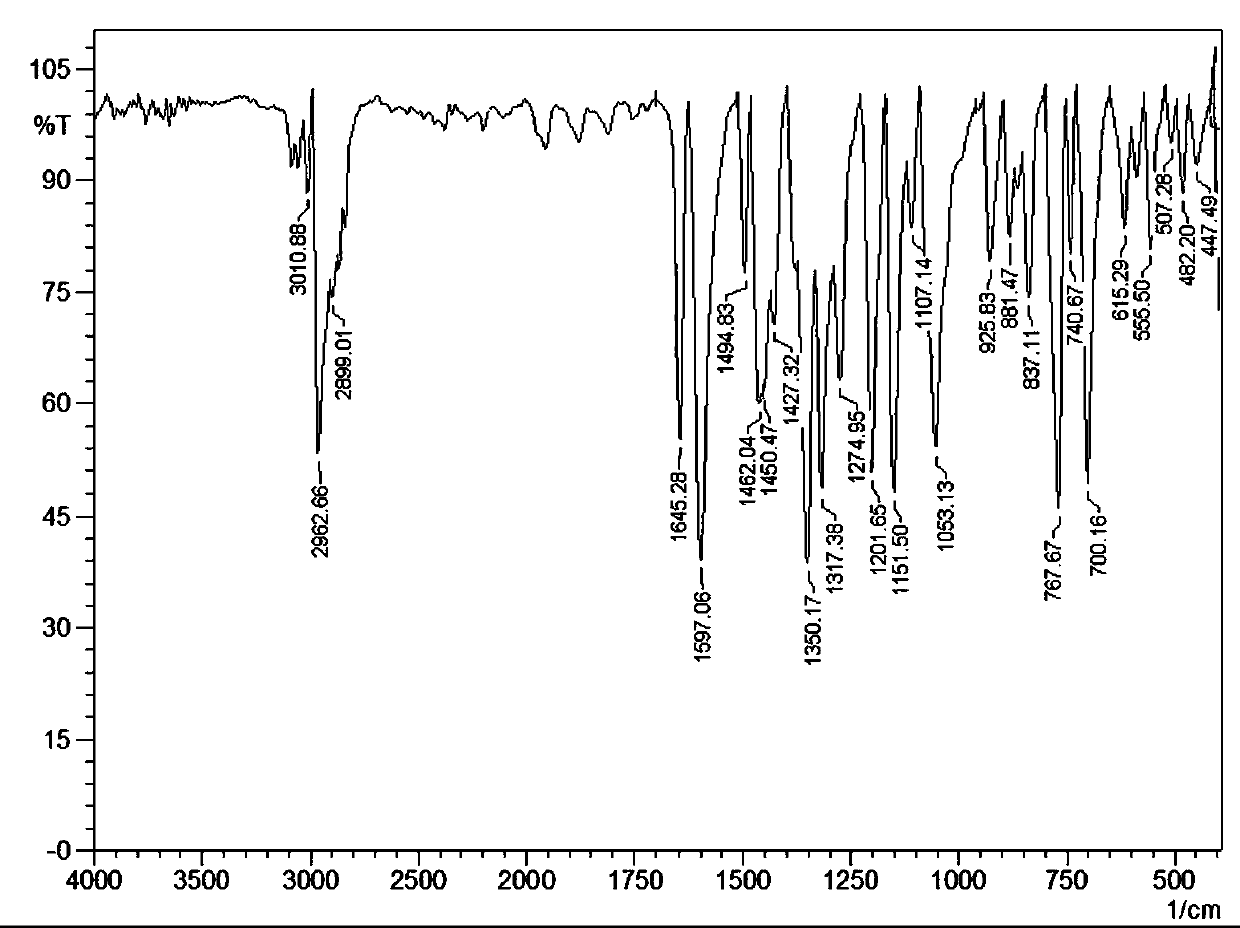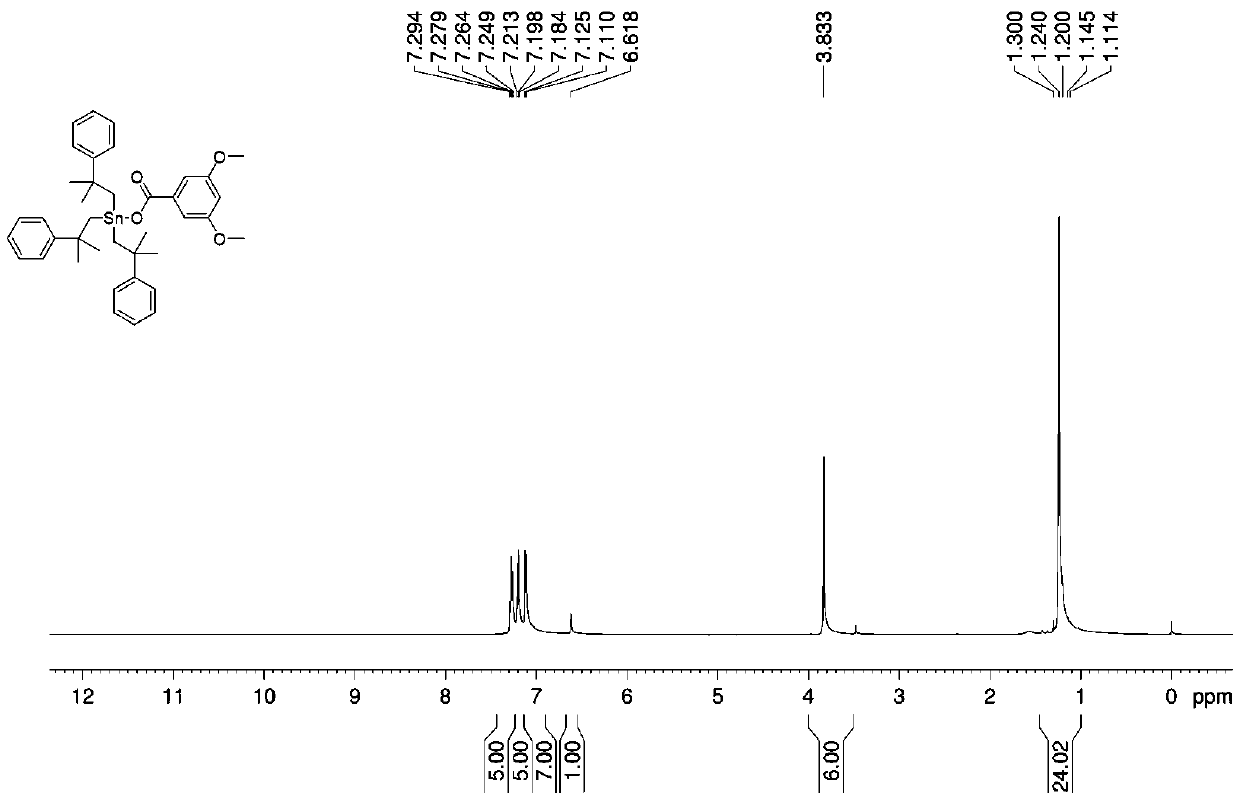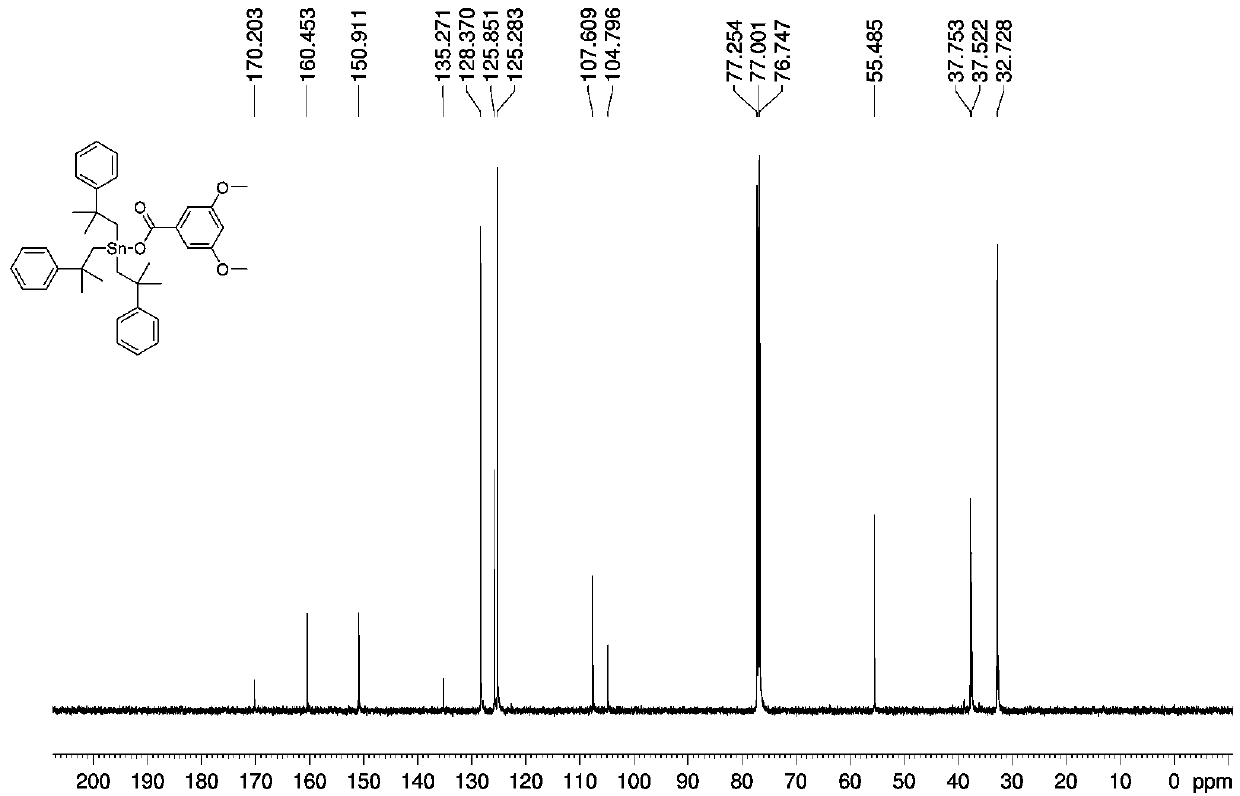Preparation method and application of tri(2-methyl-2-phenylpropyl)tin 3, 5-dimethoxybenzoate complex
A technology of dimethoxybenzoate and dimethoxybenzoic acid, applied in the field of tritin 3,5-dimethoxybenzoate complexes, can solve application limitations, no anticancer activity, The problem of high and low anti-cancer activity is to achieve the effect of simple preparation method, low cost and high anti-cancer activity.
- Summary
- Abstract
- Description
- Claims
- Application Information
AI Technical Summary
Problems solved by technology
Method used
Image
Examples
Embodiment 1
[0032] Preparation of tris(2-methyl-2-phenylpropyl)tin 3,5-dimethoxybenzoate complex:
[0033] Add 1.0536 g (1 mmol) of bis[tris(2-methyl-2-phenylpropyl)]tin oxide and 0.3649 g (2 mmol) of 3,5-dimethoxybenzoic acid into the microwave reaction tank in sequence , The solvent was anhydrous methanol 10 mL, under the air atmosphere, the microwave reaction was carried out at a radiation power of 800 W and a temperature of 100 °C for 60 min. After the reaction, cool naturally, filter, and the solvent volatilizes and crystallizes naturally at room temperature to obtain beige crystals, which are tris(2-methyl-2-phenylpropyl)tin 3,5-dimethoxybenzoate Complexes. Yield: 77%, melting point: 72-74 °C.
[0034] Elemental analysis (C 39 h 48 o 4 Sn): theoretical value: C, 66.96; H, 6.92. Found: C, 66.92; H, 6.95.
[0035] IR(KBr, v / cm -1): 3010.88(w), 2962.66(s), 2899.01(m), 1645.28(s), 1597.06(s), 1494.83(m), 1462.04(m), 1450.47(m), 1427.32(m), 1350.17(s ),1317.38(m), 1274.95(m), 12...
Embodiment 2
[0040] Preparation of tris(2-methyl-2-phenylpropyl)tin 3,5-dimethoxybenzoate complex:
[0041] Add bis[tris(2-methyl-2-phenylpropyl)]tin oxide 1.0534 g (1 mmol) and 3,5-dimethoxybenzoic acid 0.3829 g (2.1 mmol) sequentially into the microwave reaction tank 1. The solvent was 15 mL of anhydrous methanol. Under air atmosphere, the microwave reaction was carried out at a radiation power of 800 W and a temperature of 100 °C for 60 min. After the reaction, cool naturally, filter, and the solvent volatilizes and crystallizes naturally at room temperature to obtain beige crystals, which are tris(2-methyl-2-phenylpropyl)tin 3,5-dimethoxybenzoate Complexes. Yield: 78%, melting point: 72-74 °C.
[0042] Elemental analysis (C 39 h 48 o 4 Sn): theoretical value: C, 66.96; H, 6.92. Found: C, 66.92; H, 6.95.
[0043] IR(KBr, v / cm -1 ): 3010.88(w), 2962.66(s), 2899.01(m), 1645.28(s), 1597.06(s), 1494.83(m), 1462.04(m), 1450.47(m), 1427.32(m), 1350.17(s ),1317.38(m), 1274.95(m), 1201...
Embodiment 3
[0048] Preparation of tris(2-methyl-2-phenylpropyl)tin 3,5-dimethoxybenzoate complex:
[0049] Add bis[tris(2-methyl-2-phenylpropyl)]tin oxide 1.0537 g (1 mmol) and 3,5-dimethoxybenzoic acid 0.3653 g (2 mmol) sequentially into the microwave reaction tank 1. The solvent was 12 mL of anhydrous methanol. In an air atmosphere, the microwave reaction was carried out at a radiation power of 800 W and a temperature of 100 °C for 120 min. After the reaction, cool naturally, filter, and the solvent volatilizes and crystallizes naturally at room temperature to obtain beige crystals, which are tris(2-methyl-2-phenylpropyl)tin 3,5-dimethoxybenzoate Complexes. Yield: 79%, melting point: 72-74°C.
[0050] Elemental analysis (C 39 h 48 o 4 Sn): theoretical value: C, 66.96; H, 6.92. Found: C, 66.92; H, 6.95.
[0051] IR(KBr, v / cm -1 ): 3010.88(w), 2962.66(s), 2899.01(m), 1645.28(s), 1597.06(s), 1494.83(m), 1462.04(m), 1450.47(m), 1427.32(m), 1350.17(s ),1317.38(m), 1274.95(m), 1201.6...
PUM
 Login to View More
Login to View More Abstract
Description
Claims
Application Information
 Login to View More
Login to View More - R&D
- Intellectual Property
- Life Sciences
- Materials
- Tech Scout
- Unparalleled Data Quality
- Higher Quality Content
- 60% Fewer Hallucinations
Browse by: Latest US Patents, China's latest patents, Technical Efficacy Thesaurus, Application Domain, Technology Topic, Popular Technical Reports.
© 2025 PatSnap. All rights reserved.Legal|Privacy policy|Modern Slavery Act Transparency Statement|Sitemap|About US| Contact US: help@patsnap.com



